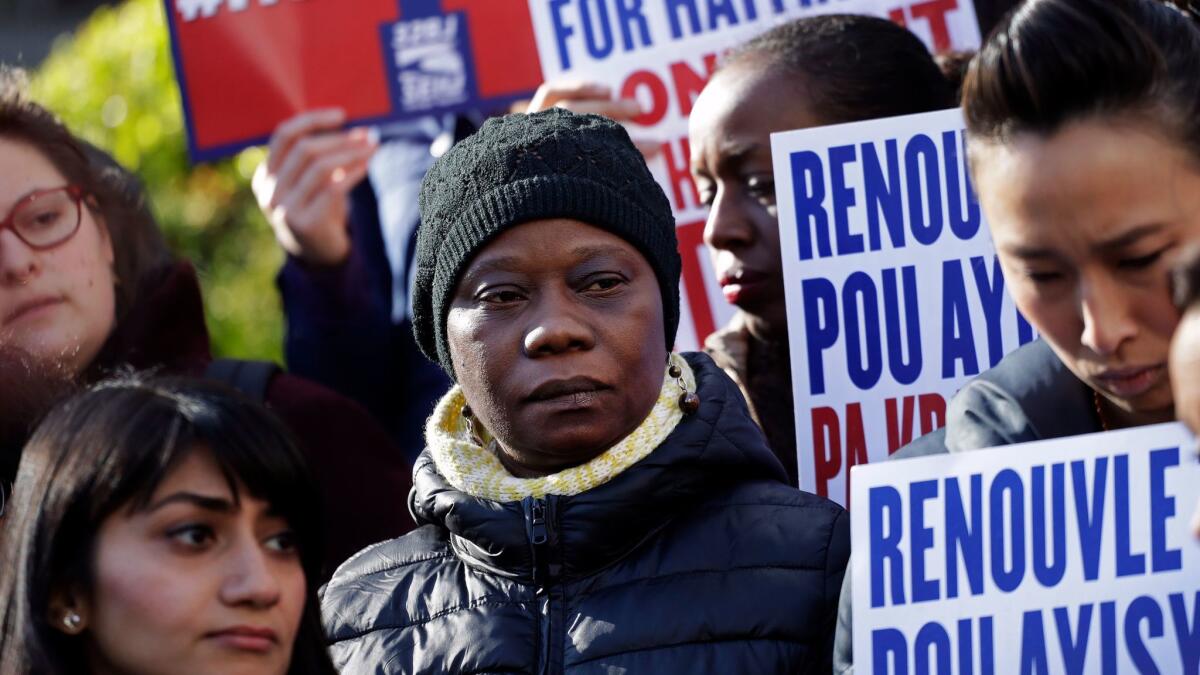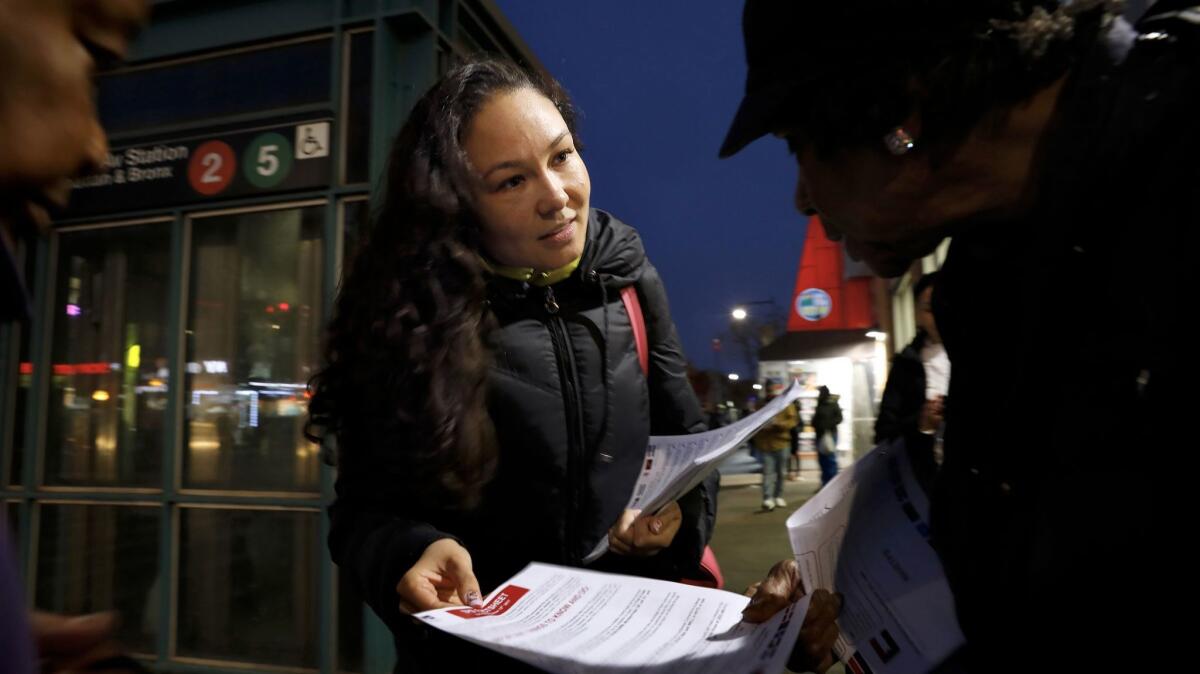Given 18 months to leave the U.S., Haitians granted special status are shocked and disappointed, but also relieved

Reporting from New York — In the Brooklyn neighborhoods of Crown Heights, East Flatbush and Canarsie, home to large Haitian populations, some residents prayed. Others just hoped.
Some made appointments with lawyers. Some residents went underground. Others left the country.
“The community is in a total panic,” labor organizer and attorney Ritha Pierre said on the eve of an announcement from the federal government about temporary legal status for Haitian immigrants.
On Monday night that announcement finally came, with the Homeland Security Department saying that 59,000 Haitian immigrants with so-called temporary protected status, or TPS, could stay in the country until July 2019 but then must leave the country.
Though the immediate panic may have subsided, uncertainty about the future did not.
“The administration punted,” Emmanuel Depas, a Haitian American attorney, said Tuesday. “Some people are shocked and disappointed, some are relieved.”
Some reacted Tuesday by taking to the streets of New York to protest, carrying signs saying “Here to stay” and “Renew TPS for Haitians! Don’t break families apart!”
Daniel Ulysse, a chaplain at the French Speaking Baptist Church of Brooklyn, said that although he was not surprised by the Trump administration’s decision — “We didn’t expect something forever” — he was grateful the end of TPS status was pushed back to 2019. An earlier proposal had called for the Haitians’ temporary status to end in early 2018.
“We needed that two years. We were praying, we were lobbying to get that extension — and now we need to fix things in Haiti,” Ulysse said.
The legal designation of TPS, renewed periodically, offers people who are from countries affected by war or natural disaster temporary relief from deportation and allows them to work.
Haitians were first given the protections after the earthquake of January 2010, which killed more than 300,000 people, displaced more than 1.5 million people and sparked a cholera epidemic. The protections were extended several times, most recently in May, when then-Homeland Security Secretary John F. Kelly signaled the department might terminate them in six months.
Those in favor of keeping the program in place say Haitians make valuable contributions to the American economy and the cities in which they live, and that the already-strained island nation is not ready to absorb tens of thousands of people.
An October report by the Global Justice Clinic at New York University School of Law found that Haiti is still reeling from the cholera epidemic, inadequate housing and food insecurity, all of which were exacerbated by last year’s Hurricane Matthew.
Critics of the program say it was meant only to provide temporary assistance and that termination is long overdue.
“The ‘T’ in TPS stands for ‘temporary,’ ” said Ira Mehlman, a spokesman for the Federation for American Immigration Reform, ahead of the decision. “It was never intended to be a long-term benefit that people could extend ad infinitum. And it never implied that countries had to become gardens of Eden before anyone could go home.”
In New York, home to the second-largest Haitian population in the U.S. after Florida, community leaders, organizers and elected officials made final pleas to the administration in the run-up to the decision. They held town halls, marched over the Brooklyn Bridge and sent letters to the administration urging an extension.
On Tuesday they began the work of figuring out what’s next.
The mayor’s Office of Immigrant Affairs went ahead as planned with a “day of action,” canvassing neighborhoods across the city, informing people of their rights and of legal and mental health resources available to them, and urging them to call their congressional representatives.

A member of the Canadian Parliament, Emmanuel Dubourg, was also in town meeting with community leaders to counter rumors that Haitians can easily migrate to Canada.
“It’s important to tell them there is no special program for the Haitian community,” Dubourg, himself of Haitian origin, said Monday. “We have to tell them, if they come to Canada as asylum seekers ... what’s going to be next. There are not a lot of Haitian people eligible for asylum claims.”
Dubourg represents a Montreal-area district that saw an influx of Haitians over the summer. He said his outreach was not meant to deter people from trying to immigrate to Canada, but to inform them of legal pathways and of the possibility of deportation.
The expiration of TPS will present a conundrum for approximately 6,000 Haitian New Yorkers. Many have homes, jobs or family members they don’t want to leave behind.
In New York state, about half of all Haitian immigrants work in the education, health and social services industries, according to Census Bureau data.
Laura Joseph, executive director of Bhrags Home Care Corp., which provides home health services to many Haitian clients in Canarsie, estimated that about half of her employees were Haitian as well.
“I’m affected from both angles,” Joseph said. “My clients will be removed, and I won’t have Haitian employees to take care of Haitians.”
Their earnings are also vital to those back home: In 2016, remittances made up nearly 30% of Haiti’s gross domestic product, according to the World Bank.
Lawmakers, including several from Florida and New York, have introduced bipartisan legislation that would grant TPS holders a path to permanent legal status and called on Congress to pass the bills in the wake of the administration’s decision.
Until then, community leaders say they will urge Haitians to come up with a plan, even as they hope for a long-term fix. That could mean preparing for a return to Haiti or examining alternative legal options, such as petitioning for status through a family member or a special visa for those who have been victims of a crime.
For Haitian residents with American-born children, the difficult choice of whether to stay in the U.S. and go into hiding or go back to a country their children have never known has been put on hold — for now.
Roodelyne, a single mom who relies on her work authorization for her job taking care of disabled adults, was in angst ahead of the decision. Like many Haitians nervous about their status, she asked that only her first name be used.
“Nobody would survive here without [TPS] because you won’t be able to work,” she said.
Roodelyne, whose house in Haiti was destroyed in the earthquake, said she had nobody in the U.S. who could take care of her 8-year-old son, nor did she have family or friends to turn to on the island.
“Everybody that I know was in the same situation as me in 2010 — we spread all over,” she said.
Despite the short-term relief she has now been granted, Roodelyne said she was sad about the administration’s decision.
“I don’t know what’s going to happen,” she said. “Maybe we have enough time for something to change.”
Twitter: @AgrawalNina
ALSO
Trump administration plans to end protected status for about 60,000 Haitian immigrants
Is it OK to mention a person’s immigration status in court? Washington state says no
UPDATES:
5:40 p.m.: The story was updated with additional details about conditions in Haiti and comments from Laura Joseph.
The story was originally published at 1:35 p.m.
More to Read
Sign up for Essential California
The most important California stories and recommendations in your inbox every morning.
You may occasionally receive promotional content from the Los Angeles Times.











